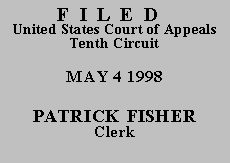

| JAMES L. TRIPLETT,
Plaintiff-Appellant, v. KENNETH S. APFEL, Commissioner, Social Security Administration, Defendant-Appellee. |
|
Claimant James L. Triplett appeals an order of the magistrate judge(1) affirming the decision of the Commissioner of Social Security denying his request for social security disability benefits. Our review of the Commissioner's decision is limited to determining whether the decision is supported by substantial evidence, and whether the Commissioner applied correct legal standards. See Castellano v. Secretary of Health & Human Servs., 26 F.3d 1027, 1028 (10th Cir. 1994). In light of these standards, and after a thorough review of the record, we affirm.
In order to determine whether a claimant is under a disability, the Commissioner applies a five-step process. See 20 C.F.R. §§ 404.1520; Williams v. Bowen, 844 F.2d 748, 750-52 (10th Cir. 1988) (discussing five steps in detail). Here, claimant alleged disability as of September 19, 1991, due to heart problems; bulging disks; arthritis in the back; depression; and fatigue, dizziness and breathing problems purportedly caused by chemical exposure. Following an administrative hearing, the ALJ found that claimant suffers from osteoarthritis, coronary artery disease, and chronic obstructive pulmonary disease caused by claimant's smoking and exposure to chemicals. The ALJ determined at step five of the applicable analysis, that, although claimant is unable to return to his past relevant work as a truck driver or custodian, he has the residual functional capacity (RFC) to perform a full range of light work, reduced by the need to avoid prolonged walking, standing, or sitting; exposure to pollutants, irritants, unprotected heights; and dangerous moving machinery or heavy machinery. The ALJ obtained vocational expert (VE) testimony, and determined that a significant number of jobs exist that claimant could perform, compelling a conclusion that claimant was not disabled.
The Appeals Council denied review, and claimant filed suit in federal district court. The magistrate judge affirmed the agency's decision. This appeal followed.
Claimant first contends the ALJ improperly considered the limiting effects imposed by his cardiac impairment because the ALJ selectively considered only that medical evidence that supported the denial of benefits, and ignored or failed to give rationale for disregarding the findings and opinions of two examining physicians, Dr. Williams and Dr. Hastings, concerning the limiting effect of his heart condition.
We have carefully reviewed the record and conclude from the ALJ's discussion of the medical evidence that he reviewed and considered all of the medical evidence, including the notes and opinions of Drs. Williams and Hastings. Our review of the record reveals substantial evidence supporting the ALJ's determination that claimant can perform light work with the restrictions noted by the ALJ. Although the ALJ did not specifically discuss the reports from Drs. Williams and Hastings, he stated that he had considered all of the evidence and specifically cited to the reports from these physicians.
Contrary to claimant's assertion, the ALJ did not rely conclusively on the opinion of the consultative report from Dr. Jennings. Indeed, the ALJ's evaluation of claimant's heart condition and his ultimate disability decision is consistent with most of the treating and examining physicians' reports and opinions, which is further indication that he considered all of the evidence. To the extent claimant seeks to challenge the weight the ALJ gave to the evidence, his argument must fail. See Casias v. Secretary of Health & Human Servs., 933 F.2d 799, 800 (10th Cir. 1991) (on appellate review, we can neither reweigh the evidence nor substitute our judgment for that of the ALJ). While it would have been preferable for the ALJ to have specifically addressed Dr. Williams' and Dr. Hastings' opinions in his decision, the failure to do so in this case is not reversible error. See Clifton v. Chater, 79 F.3d 1007, 1009-1010 (10th Cir. 1996) ("The record must demonstrate that the ALJ considered all of the evidence, but an ALJ is not required to discuss every piece of evidence."); Hamilton v. Secretary of Health & Human Servs., 961 F.2d 1495, 1498-99 (10th Cir. 1992) ("The ALJ stated that he considered all of the evidence; his reliance on medical findings does not allow us to assume otherwise.").
Claimant also contends that the ALJ's failure to consider the evidence from Drs. Williams and Hastings tainted the value of the VE's testimony because the ALJ failed to include all of claimant's limitations in the hypothetical questions he posed to the VE. We have already concluded that the ALJ did consider all of the medical evidence, and our review of the record indicates that the ALJ's questions to the VE included the limitations that he found were supported by the record. Accordingly, the testimony of the VE provided substantial evidence of a significant number of jobs in the national economy that claimant could perform. See Decker v. Chater, 86 F.3d 953, 955 (10th Cir. 1996) (hypothetical questions need only reflect impairments and limitations borne out by the evidentiary record).
Claimant finally contends that at the time his insured status expired he was fifty years of age and qualified as disabled under the Medical-Vocational Guidelines based on his contention that he is limited by his heart impairment to no more than sedentary activity. Claimant makes this argument for the first time on appeal; therefore, we will not consider it. See Crow v. Shalala, 40 F.3d 323, 324 (10th Cir. 1994) (issues not presented to district court not considered on appeal absent compelling reasons).
The judgment of the United States District Court for the Northern District of Oklahoma is AFFIRMED.
Entered for the Court
Senior Circuit Judge
*. This order and judgment is not binding precedent, except under the doctrines of law of the case, res judicata, and collateral estoppel. The court generally disfavors the citation of orders and judgments; nevertheless, an order and judgment may be cited under the terms and conditions of 10th Cir. R. 36.3.
1. The parties consented to proceed before a magistrate judge. See 28 U.S.C. § 636(c).